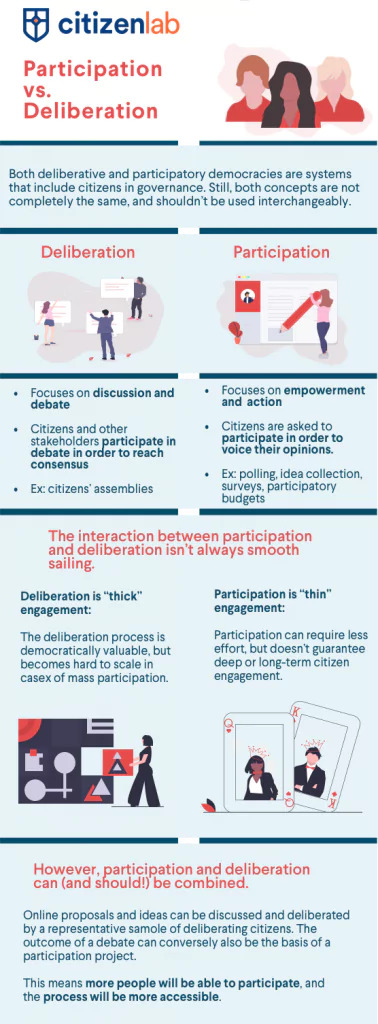Worksheet for Lesson 5:
Design and Implementation of Socratic Seminars and Roundtables for Informed Decision-making
Learning Objectives:
2. Students learn about the historical use, and present usefulness of Socratic Seminars and roundtables in decision-making processes
All these deliberative and participatory practices that you learnt about in lesson 4 have also influenced the way teachers are delivering their courses as well as school curricula structure and scopes. In particular, it is observed that new pedagogies in teaching practices focus now more on encouraging student-led discussions and deliberation in classes as a method to stimulate critical thinking skills. Moreover, these participatory approaches are expected to also nurture civic behaviours and democratic attitudes in students that learn how to engage in a fruitful dialogue with their peers, learning thus how to respect in practice diverse opinions and worldviews.
In this lesson, we will focus on an innovative way to encourage student-led discussions in the classroom, known as “Socratic Seminars”.
Let’s find out together what they are and how you can apply them in your learning and teaching context!
What are Socratic Seminars and Roundtables
Socratic seminars and roundtables have taken their name from an ancient Greek philosopher who was widely known for his particular method of generating and encouraging thought-provoking discussions with friends and citizens in ancient Athens. Socrates’ approach was based on stimulating engagement in dialogue for a topic or an abstract idea that was then elaborated on and touched upon by participants in his group discussion. Through a series of engaging and thought- provoking questions, Socrates aimed to bring to the fore ideas and opinions that were deeply rooted in the minds of his interlocutors while making them question their own beliefs and values.
The aim of Socratic seminars or round tables is to make students aware of civic engagement in civic dialogue and collaboration as well as nurture their critical thinking skills and citizenship behaviours.
Socratic seminars are usually comprised of four fundamental elements, specifically:
• The text: the topic, idea or subject upon which students will engage in dialogue (e.g. a video, a piece of literature, a science issue, etc.)
• The Question(s): At the beginning of the seminar, one opening question is set by students to trigger discussion. From this question and the thoughts it will provoke, more questions will be generated.
• The leader: A person who is in charge of presenting all aspects of the “text” and thus helping students in the further exploration of the topic.
• Participants: Usually students should be prepared to engage in the discussions by having read the text well and prepared to pose and answer questions during the seminar.
How to design and implement Socratic Seminars and Roundtables
Stage 1: Planning
In this phase, both teachers and students are getting prepared for the upcoming seminar by studying thoroughly about the issue upon which they have selected to discuss, as well as preparing questions to be addressed by participants. For educators, in this phase, it is important to clearly set the tone and aim of the Socratic seminar to students by explaining to them its key goal and the way it is practised, avoiding thus misunderstandings. Educators should set at this stage clear discussion rules and exemplify discussion procedures to students. For students, this stage serves to explore on their own and question themselves about the selected topic of discussion. They also learn how to bring their own questions to the table.
Stage 2: Implementation
Socratic seminars are usually done in a circle, meaning that students sit in a circle so that they all see each other. The same applies to the round tables, with the only difference being that students gather in a singular round table where they can lean in and discuss ideas (Spencer, 2022). When everyone’s ready, the discussion is triggered by the opening question. What is crucial for educators and students in this stage is to understand that there are no right or wrong answers and that questions brought to the discussion should not lead to absolute answers or statements. Educators should facilitate discussion and exchange of ideas between students. Remember, this is a participatory approach to encourage the critical thinking of students as well as stimulate their collaboration and social interaction skills.
Stage 3: Assessment
For educators, they should set specific metrics for success and evaluation tools to assess the quality and results of the Socratic seminar. Assessment is also useful for both educators and students in order to get evidence-based insights and learn to prepare better for the next seminar.

REFERENCES
https://www.socraticseminars.com/ https://isa.edu.gr/page/what-is-a-socratic-seminar
https://www.teachthought.com/critical-thinking/definition-of-socratic-seminar/
https://spencerauthor.com/socratic-seminars/
https://www.edutopia.org/blog/socratic-seminars-culture-student-led-discussion- mary-davenport
https://edtechbooks.org/studentguide/socratic_seminar https://www.teachingchannel.com/blog/socratic-seminars
It's Quiz Time!
It’s quiz time!
Here’s a fun quiz that you could use to test your understanding of the key concepts
covered in this lesson:
Quiz Summary
0 of 4 Questions completed
Questions:
Information
You have already completed the quiz before. Hence you can not start it again.
Quiz is loading…
You must sign in or sign up to start the quiz.
You must first complete the following:
Results
Results
0 of 4 Questions answered correctly
Your time:
Time has elapsed
You have reached 0 of 0 point(s), (0)
Earned Point(s): 0 of 0, (0)
0 Essay(s) Pending (Possible Point(s): 0)
Categories
- Not categorized 0%
- 1
- 2
- 3
- 4
- Current
- Review
- Answered
- Correct
- Incorrect
-
Question 1 of 4
1. Question
Socratic seminars were practised in ancient Athens:
CorrectIncorrect -
Question 2 of 4
2. Question
Socratic seminars and round-tables as teachers-led processes:
CorrectIncorrect -
Question 3 of 4
3. Question
To engage in a Socratic seminar, students should
CorrectIncorrect -
Question 4 of 4
4. Question
Which of the following are the most common stages of a Socratic seminar design and implementation:
CorrectIncorrect





